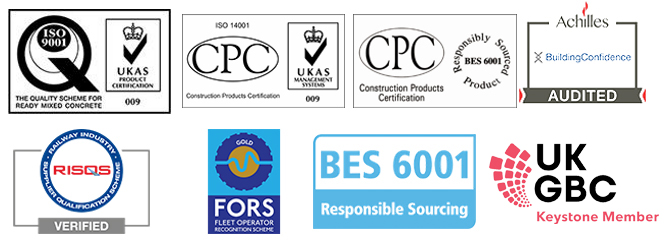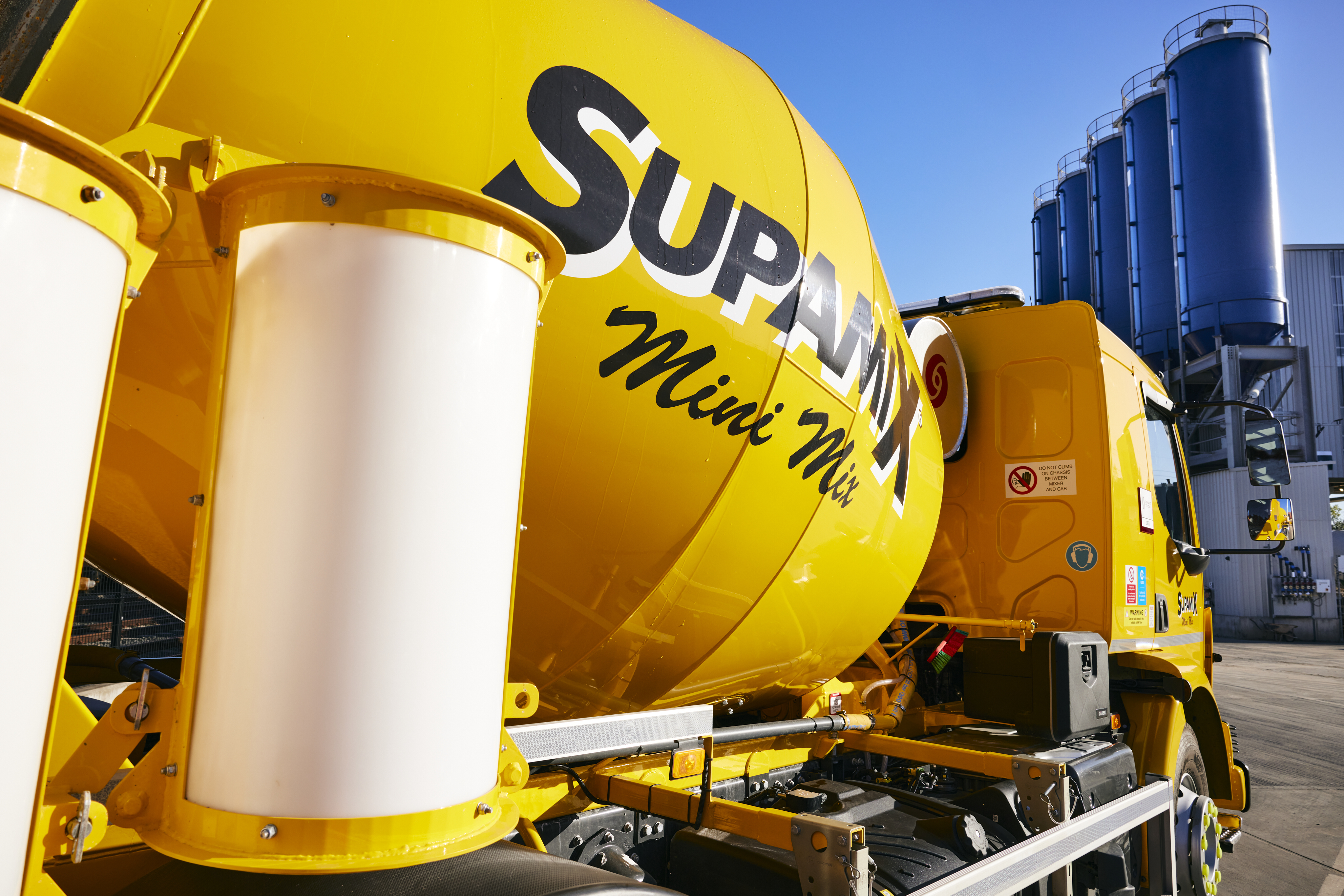Fibre reinforced concrete
FibreCrete is our premium range of fibre reinforced concrete, where we’ve engineered products with advanced fibre technology to boost both performance and durability. Adding fibres to ready-mixed concrete improves the structural performance of the fibre reinforced concrete, increasing tensile strength and reducing the potential for early-age plastic shrinkage cracking.
All 178 of our static and mobile production plants supply FibreCrete, so you can benefit from superior solutions for a wide range of construction needs. Significant time and cost savings can be made with the added benefit of a superior concrete quality, like fibre reinforced concrete.
Enhance durability, drive efficiencies, and work towards eliminating the need for traditional rebar reinforcement with Heidelberg Materials’ fibre reinforced concrete.
What applications can fibre reinforced concrete be used for?
At Heidelberg Materials UK, we produce fibre reinforced concrete that is suitable for structural and non-structural applications.
Structural
Plastic fibre reinforced concrete
Plastic structural fibres are manufactured from a high-strength, high modulus synthetic plastic. They are designed to replace welded mesh and light reinforcement bars, eliminating concern associated with correct placement of reinforcement and correct cover.
Applications of plastic fibre reinforced concrete include:
- Ground-bearing slabs
- Agricultural yards and roads
- Lightweight applications
- Architecturally sensitive buildings
- Complex, geometric elements
Steel fibre reinforced concrete
Steel structural fibres are manufactured in various grades, deformations, and sizes to suit most concrete flooring applications.
Applications of steel fibre reinforced concrete include:
- Heavily trafficked industrial paving (scrap yards)
- Industrial ground bearing slabs
- Jointless ground bearing slabs
- Suspended slabs on piles
- Impermeable concrete slabs
Benefits of structural fibre reinforced concrete
Plastic and steel fibre reinforced concrete share many benefits, including increased crack control. Both concretes also reduce overall construction cost over steel and manual handling and placement time (no steel fixing is needed).
Plastic fibre reinforced concrete reduces structural weight (like suspended slabs/roof elements), whereas steel fibre reinforced concrete increases surface abrasion resistance.
NOTE: Where either plastic or steel fibres are used as either a partial or total replacement to conventional steel reinforcement, we recommend that the structural designer is consulted.
Non-Structural
Polypropylene micro fibre reinforced concrete
Non-structural fibres are not an admixture - they are classified as an addition and can be added to almost all conventional concrete mixes. Any concrete mix incorporating fibres complies with both current European standards and British standards and requires no additional specification criteria.
Polypropylene micro fibre reinforced concrete reduces shrinkage, potential for settlement cracking, and risk of delaminating. It also increases resistance to freeze thaw damage (when used with a conventional air entraining agent) and surfaces durability.
NOTE: These benefits are subject to good concreting practice (placement, finishing and curing).
Applications of polypropylene fibre reinforced concrete include:
- Concrete slabs/external paving
- Deep sections >500mm
- Strip footings and foundations
- Concrete elements with a high length to width ratio (e.g. pathways/kickers) - the majority of concrete will benefit from being fibre reinforced
Why use fibre reinforced concrete?
Fibres are the ideal component for enhancing and improving concrete and mortar because they’re easy to work with and bond well within the mix, whatever the application.
Sprayed concrete
The ductility of sprayed concrete is increased with the addition of fibres. If the sprayed concrete lining of an excavated tunnel support is cracked due to high flexural stresses, fibre reinforced concrete can accommodate tensile forces and act as an excellent yielding support.
Fibres also:
- Increase the mechanical capacity of the lining, reducing or omitting the need for extra reinforcement.
- Result in faster, more cost-effective tunnel excavation support installation.
Fire protection
Synthetic micro fibres increase the fire resistance of concrete, which is particularly important in structures like traffic tunnels. Fibre reinforced concrete structures with these micro fibres are more stable and durable, and safer.
- Synthetic fibres within the concrete melt and create a capillary system
- Water vapour pressure can be relieved
- Concrete spalling is either reduced significantly or prevented completely
- Amount of repair work required is reduced
Slabs, runways and roads
Using fibres in concrete floor slabs and runways helps to stabilise the reinforced concrete mix and greatly reduces early-age shrinkage cracks.
Fibres result in:
- Better flexural behaviour
- Greater impact resistance
- Increased durability
The amount of extra reinforcement needed can be reduced and the joint spacing increased. Fibres also help to prevent the joints and other perimeter edges from shearing.
High strength concrete (HSC) and ultra-high performance concrete (UHPC)
Particularly slender components usually require HSC or UHPC, as do projects where high structural and load-bearing stability is needed during extreme conditions. Thin, short fibres that have a high E-modulus can be used in these cases. This means extra, untensioned reinforcement can be reduced or combined with the fibre reinforcement to greatly increase energy absorption capabilities.
Where our fibre reinforced concrete has been used
Witchford Recycling Centre
Working in partnership with Sika, Heidelberg Materials Concrete supplied steel fibre reinforced concrete to this purpose‑built recycling centre in Witchford, near Ely, for Cambridgeshire County Council. The groundwork contractor wanted to avoid using traditional steel mesh reinforcement, so they opted for a concrete solution that created a durable and strong base slab in a cost‑effective manner.
Greengill Anaerobic Digestion Plant
We’ve supplied our FibreCrete concrete to a renewable energy project in Penrith, Cumbria, where a 2.4MW anaerobic digestion (AD) plant has been constructed.
“The original specification for the tanks was a concrete with reinforcing mesh to provide the structural performance required. But I have used Heidelberg Materials’ FibreCrete on previous projects and know what it can deliver in terms of time and cost savings. With this proven track record, it was not difficult to convince the client of its benefits and the results speak for themselves.”
Tim Kemp, contractor for Greengill Anaerobic Digestion Plant
Our accreditations
Heidelberg Materials is a member of the Quality Scheme for Ready-Mixed Concrete (QSRMC) and all our reinforced fibre concrete products carry this certification.

From the experts: Fibre reinforced concrete
“The original specification for the bays was a concrete with reinforcing mesh to provide the structural performance required, but I have used Heidelberg’s FibreCrete on previous projects and know what it can deliver in terms of time and cost savings.
“With this proven track record it was not difficult to convince the client of its benefits and the results speak for themselves.”
Tim Kemp, Owner of T J Kemp Ltd
Why you can trust Heidelberg Materials
![]() Quality-Assured Fibre Reinforced Concrete
Quality-Assured Fibre Reinforced Concrete
Our ranges of fibre reinforced concrete have been tested to the highest standards, with solutions to suit every application.
![]() Extensive Product Availability
Extensive Product Availability
Choose from 178 static and mobile plants across the UK for your fibre reinforced concrete supply.
![]() Bespoke Fibre Reinforced Concrete Products
Bespoke Fibre Reinforced Concrete Products
Select your ideal additives, admixtures, cement and aggregates.
![]() Dedicated Sales Support
Dedicated Sales Support
We integrate sales management with every order for seamless delivery.
![]() National Delivery Fleet
National Delivery Fleet
Trust our 1,200 vehicles, 140 rail freight wagons, and 4 locomotives to safely deliver your concrete.
Contact details
Contact the team nearest to you using the details in the table below. Alternatively, please complete the contact form at the bottom of this page.
| Region | Telephone | Email address |
| Scotland | 0330 123 4627 | concretescotland@uk.heidelbergmaterials.com |
| North East | 0330 123 4628 | concretenortheast@uk.heidelbergmaterials.com |
| North West | 0330 123 4629 | concretenorthwest@uk.heidelbergmaterials.com |
| Central West | 0330 123 4631 | concretecentralwest@uk.heidelbergmaterials.com |
| Central East | 0330 123 4632 | concretecentraleast@uk.heidelbergmaterials.com |
| South West | 0330 123 3406 | concretesouthwest@uk.heidelbergmaterials.com |
| South Wales | 0330 123 3403 | concretesouthwales@uk.heidelbergmaterials.com |
| South East | 0330 123 4633 | concretesoutheast@uk.heidelbergmaterials.com |
| London | 0330 123 4635 | concretelondon@uk.heidelbergmaterials.com |
- What is fibre reinforced concrete?
-
Fibre reinforced concrete is ready-mixed concrete that has had fibres added to it to improve the product’s structural performance. This type of concrete offers a range of benefits to both structural and non-structural applications, such as:
- Increased tensile strength
- Improve surface durability
- Increased fire resistance
Learn more about ready-mixed concrete.
- What fibres are plastic fibre reinforced concrete made from?
-
Our plastic fibre reinforced concrete is made from synthetic polypropylene macro fibres, which have a lower E-modulus (5 – 15 GPa) than steel fibres. They’re effective in the early phases of hardening to prevent and/or reduce the size of cracks developing in the concrete. The synthetic macro fibres that make up plastic fibre reinforced concrete are also corrosion-resistant and give the concrete greater ductility.
- What fibres are steel fibre reinforced concrete made from?
-
Our steel fibre reinforced concrete is made from steel fibres characterised by high E-modulus (200 GPa) and high tensile strength (2,500 MPa). These fibres prevent creep of the concrete but don’t counteract early-age shrinkage. If any corrosion occurs, it won’t cause spalling of the concrete – just a change of colour on the concrete surface.
- What is polypropylene micro fibre reinforced concrete made from?
-
Our polypropylene micro fibre reinforced concrete is made from synthetic micro fibres, which have an even lower E-modulus (3 – 5 GPa) than synthetic macro fibres found in plastic fibre reinforced concrete. These synthetic micro fibres have a low melting point of (160°C) and are mainly used to reduce early-age shrinkage cracking and improve fire resistance.
- What is the difference between fibre reinforced concrete for structural and non-structural applications?
-
Structural fibres, like plastic or steel, are classed as admixtures and are manufactured for specific purposes. Plastic structural fibres act as a replacement for light reinforcement bars and welded mesh, and steel structural fibres suit most concrete flooring applications. On the other hand, non-structural micro fibres are classed as an addition and can be added to almost all conventional concrete mixes.
View all concrete products.
- Do concrete mixes incorporating fibres comply with current European and British standards?
-
Yes, all our concrete mixes that make up our fibre reinforced concrete solutions are fully compliant with current European and British standards.
- How do I know if I need fibre reinforced concrete?
-
Fibre reinforced concrete is used in applications where properties like high impact resistance, reduced cracking damage, and fire resistance are important. You will find this type of concrete in infrastructure like:
- Roads
- Bridge decks
- Floor screeds
- Precast concrete units
- Sprayed and/or tunnel concrete linings
Click for more information about concrete for commercial, residential, and industrial applications.




